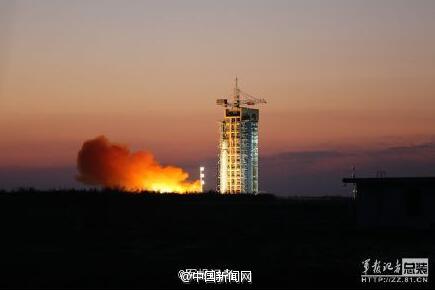China launches satellite to shed light on invisible dark matter
Updated: 2015-12-17 10:02
(Xinhua)
|
||||||||
JIUQUAN, Gansu - China on Thursday sent into space the country's first space telescope in a fresh search for smoking-gun signals of dark matter, invisible material that scientists say makes up most of the universe's mass.
The Dark Matter Particle Explorer (DAMPE) Satellite, nicknamed "Wukong" after the Monkey King with penetrating eyes in the Chinese classical fiction Journey to the West, was blasted off Thursday morning on a Long March 2-D rocket from the Jiuquan Satellite Launch Center in northwest China's Gansu Province.
It will enter a sun-synchronous orbit at a height of 500 kilometers to observe the direction, energy and electric charge of high-energy particles in space.
From there, scientists hope the 1.9-tonne desk-sized satellite could help lift the "invisible cloak" on the dark matter and shine more light on the hypothetical mass.
Dark matter, which does not emit or reflect enough electromagnetic radiation to be observed directly, is one of the huge mysteries of modern science.
Theorized by scientists who could not understand missing mass and strangely bent light in faraway galaxies, dark matter has become widely accepted in the physics community even though its existence has never been concretely proven.
Scientists now believe only around five percent of the total mass-energy of the known universe are made up of ordinary matter, whereas dark matter and dark energy make up the rest.
Knowing more about dark matter could hence give humanity a clearer idea about the past as well as future of galaxies and the universe, and will be revolutionary for the world of physics and space science.
With the new DAMPE satellite, scientists will look for evidences of dark matter annihilation or decay.
Wukong will scan the space in all directions in the first two years and focus on sections where dark matter are most likely to be observed afterwards.
More than 100 scientists will study the data sent back by Wukong. Initial findings are expected to be published in the second half of 2016.
- Pandas prefer choosing their own sex partners, researchers find
- Tycoons exchange views on building a cyberspace community of shared future
- China successfully launches its first dark matter satellite
- Report: Layoffs may loom next year
- China launches satellite to shed light on invisible dark matter
- China strongly opposes US arms sale to Taiwan
- Good international coordination a must to combat terrorism
- Chinese embassy: spy report 'sheer fiction'
- US, Cuba agree on restoring commercial flights
- Fed raises interest rates, first rate hike since 2006
- IAEA decides to close nuclear weapons probe of Iran
- Russia, US call for common ground over issues

 Canadian college offers flying classes to legless girl
Canadian college offers flying classes to legless girl
 Fashion buyer scours the world for trendy items
Fashion buyer scours the world for trendy items
 Tycoons exchange views on building a cyberspace community of shared future
Tycoons exchange views on building a cyberspace community of shared future
 Snow scenery of Taklimakan Desert in Xinjiang
Snow scenery of Taklimakan Desert in Xinjiang
 East China province gets 1st subway line
East China province gets 1st subway line
 President Xi delivers keynote speech at World Internet Conference
President Xi delivers keynote speech at World Internet Conference
 Chinese premier shows Zhengzhou's fast growth to SCO leaders
Chinese premier shows Zhengzhou's fast growth to SCO leaders
 Two Chinese Antarctic expedition teams set off for Antarctic inland
Two Chinese Antarctic expedition teams set off for Antarctic inland
Most Viewed
Editor's Picks

|

|

|

|

|

|
Today's Top News
Shooting rampage at US social services agency leaves 14 dead
Chinese bargain hunters are changing the retail game
Chinese president arrives in Turkey for G20 summit
Islamic State claims responsibility for Paris attacks
Obama, Netanyahu at White House seek to mend US-Israel ties
China, not Canada, is top US trade partner
Tu first Chinese to win Nobel Prize in Medicine
Huntsman says Sino-US relationship needs common goals
US Weekly

|

|








